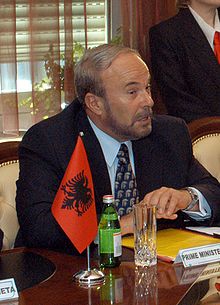Fatos Nano
Fatos Nano (born September 16, 1952 in Tirana ) is a former Albanian politician . From 1991 to 2005 he was chairman of the Socialist Party and during this time also Prime Minister several times.
Studies and professional life
Fatos Nano studied political economy at the University of Tirana . It was there that he also obtained doctoral degrees in philosophy and economics. From 1975 to 1978 he worked in the metallurgical combine in Elbasan, from 1981 to 1983 he worked for an agricultural cooperative. From 1978 to 1981 and then from 1984 to the political turning point in 1990 he was employed at the Institute for Marxism-Leninism in Tirana.
Nano as a politician
At the end of 1990, in the final months of the communist regime, he was brought into the government of Adil Çarçani by the then head of state and party, Ramiz Alia , as a late sign of the Labor Party's readiness for reform . In February 1991, Nano was appointed head of government. The first pluralistic elections on March 31, 1991 were won by his party. In the cities where the opposition won the most votes, however, popular popular protests continued until Nano stepped down a few months later and a government was formed under his party comrade Ylli Bufi and with the participation of the opposition.
In June 1991 the Labor Party changed its name to the Socialist Party, reformed its statute and Nano became chairman. After the elections of March 22, 1992, he was opposition leader until he was jailed on July 30, 1993 for misusing state funds. Many described his sentencing to several years in prison as politically motivated. During the civil war in 1997 , Nano was liberated and pardoned by the outgoing President and political opponent Sali Berisha .
After the Socialist Party won the 1997 elections, Nano was appointed Prime Minister by President Rexhep Meidani . After public unrest in 1998 organized by the Democratic Party over the murder of the opposition leader Azem Hajdari , he resigned as head of government and party chairman and left the first office to the 31-year-old socialist Pandeli Majko . But when he wanted to take over the party leadership a year later, Nano also ran and narrowly won a fight vote.
On July 25, 2002, after an unsuccessful attempt to be nominated for the office of President and disagreements with Prime Minister Meta, Nano managed to take over the government again. In 2004, tens of thousands of people again demonstrated against his policies. The opposition accused him of driving the country into economic ruin through unprecedented corruption.
The socialists lost the parliamentary elections on July 3, 2005, and Sali Berisha of the Democratic Party replaced Nano as head of government in September 2005. Nano also resigned as party leader. He was succeeded by Edi Rama , the then mayor of Tirana.
In the summer of 2007 Nano ran unsuccessfully for the office of president. He acted against the will of the socialist party leader Rama.
In 2009, Nano was not re-elected for another legislative period in parliament, since then the politician has been quieter.
literature
- Clarissa de Waal: Albania Today. A portrait of post-communist turbulence . Tauris, London et al. 2005, ISBN 1-85043-859-5 .
- Nikollë Lesi: Si i njoha Nanon dhe Berishën . Gjergj Fishta, Tirana 2005, ISBN 99943-810-4-0 .
Web links
| personal data | |
|---|---|
| SURNAME | Nano, Fatos |
| BRIEF DESCRIPTION | Albanian politician |
| DATE OF BIRTH | September 16, 1952 |
| PLACE OF BIRTH | Tirana |
